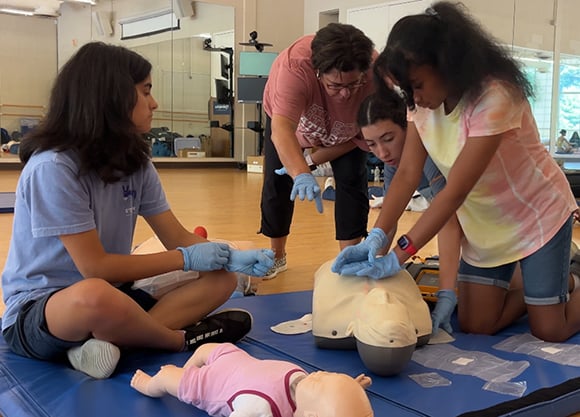
High school students learn CPR, other skills at Quinnipiac summer program
August 27, 2024

August 27, 2024

“We have to make sure the chest comes all the way back to the starting position before we’re pressing down on it again,” Lewis explained in a confident, yet reassuring voice. “Remember, our goal is to mimic the heart. We’re trying to pump the blood through the body like a heart would.”
One-half of the faces were fixed on her every word. The other half, well, they were staring off in space, not even pretending to pay attention.
CPR manikins are like that. But not these teenagers.
For two weeks this summer, high school students from across the Northeast came to Quinnipiac to take part in the Healthcare Career Exploration Academy. Along with CPR training, students learned basic first aid, suturing techniques, DNA testing, the Heimlich maneuver and more. The hands-on program was one of 10 pre-college experiences that were offered by Quinnipiac in July and August.
On this particular morning, it was all about saving lives with CPR at the Recreation and Wellness Center on the Mount Carmel Campus.
As 18 students were divided into groups of three, Lewis, Caty Mulligan ’14 and Heather Feiner visited different groups to see how they were doing. Mulligan is a part-time faculty member in the School of Health Sciences, while Feiner, a certified and licensed athletic trainer, has been an American Red Cross instructor since 1998.
Feiner approached one group and supplied the first CPR clue. “All you know is that they’re unconscious,” Feiner said, leaning in toward the manikin. “So get down low and look, listen and feel. ... Then, go to the chest and start compressions.”
The Bee Gees, those disco-era pop stars, provided the eight-count cadence for Anita Vinokur, a student at Staples High School in Westport, Connecticut, to set the pace for chest compressions.
“Ah-Ah-Ah-Ah, Stayin’ Alive, Stayin’ Alive,” Vinokur recited. “Ah-Ah-Ah-Ah, Stayin’ Alive.”
Meanwhile, Anna DiCostanzo, a student at the Forman School in Litchfield, Connecticut, kneeled alongside the manikin, clasped her hands and pumped up and down on its chest, keeping in time with Vinokur’s rhythm.
The students took turns doing chest compressions, setting the proper tempo and mock calling 911.
“You understand it more when you’re using the manikin,” Vinokur said afterward. “You’re concentrating on doing everything the right way to save a person’s life.”
Karissa Clarke, a student at Vernon Township High School in Vernon, New Jersey, felt the same when it was her turn.
“I’m glad we got to use a manikin because it made it more real,” Clarke said. “This was all new to me. It was kind of exciting to be honest.”
Next, the students learned how to perform CPR on an infant.
Instead of using clasped hands for the chest compressions, the students pressed down on the baby’s chest with both thumbs at the same time while wrapping their hands and fingers around the baby’s chest toward its back.
Once again, students and their partners worked together. For Lewis, the class instructor, the summer camp was an important opportunity for the campers.
“These skills are so valuable. Anyone has the capability to do them. It’s really about getting people comfortable and just trying them,” Lewis said. “It’s a wonderful thing you can do for your community.”
Lewis, who has worked at QU for the last 19 years, also serves as a clinical professor and lab coordinator of athletic training and sports medicine, and the coordinator of clinical education for athletic training.
For Mulligan, an adjunct professor in the School of Health Sciences who teaches medical terminology, the Healthcare Career Exploration Academy was a chance to come full circle.
“As part of being an athletic trainer and staying connected with Meg, it’s great to have the opportunity to come back and give back,” she said. “Quinnipiac is close to my heart, so to teach here now and to show these students that I’m an alum, that means a lot to me.”
Feiner agreed with Lewis and Mulligan. She said the skills the students learned will last a lifetime.
“It’s such an important public service,” said Feiner, who was inducted into the Connecticut Athletic Trainers’ Association Hall of Fame in June. “I was so impressed. The kids were very respectful. They paid attention, but they also had fun. I love to see that.”
The Healthcare Career Exploration Academy introduces students to 10 healthcare disciplines to make it easier to decide which degree program might appeal to them. Students also learn about career opportunities in the allied health professions, gain certification in health-related skills and earn two credits that are transferrable to Quinnipiac.
Other summer programs included the Bobcat Nature Academy, Data Sciences Lab, Game Design and eSports Lab, Graphic and Interactive Design Workshop, Hacker High School: Introduction to Cybersecurity, Modern Storytelling: Moviemaking, Modern Storytelling: Sports Journalism, Pre-Med Preparation: Medical Microbiology, and Public Relations and Social Media Bootcamp.
Quinnipiac Today is your source for what's happening throughout #BobcatNation. Sign up for our weekly email newsletter to be among the first to know about news, events and members of our Bobcat family who are making a positive difference in our world.
Sign Up Now